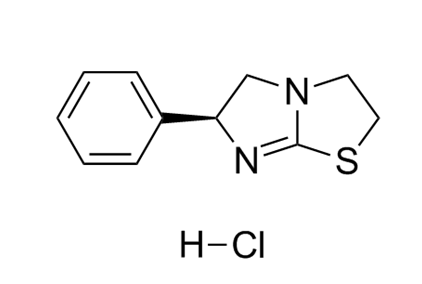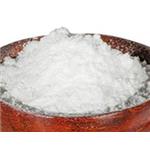levamisole hydrochloride– a synthetic imidazothiazole derivative
Jan 2,2020
Levamisole hydrochloride is the hydrochloride salt of the synthetic imidazothiazole derivative levamisole with anthelminthic and immunomodulating activities. In immunosuppressed states, levamisole may restore immune function by: 1) stimulating antibody formation, 2) stimulating T-cell activation and proliferation, 3) potentiating monocyte and macrophage phagocytosis and chemotaxis and 4) increasing neutrophil mobility, adherence, and chemotaxis [1].

Levamisole hydrochloride has been widely used in treatment of worm infestations in both humans and animals. As an anthelmintic, it probably works by targeting the nematode nicotinergic acetylcholine receptor. As an immunomodulator, it appears that Levamisole is an immunostimulant which has been shown to increase NK cells and activated T-cells in patients receiving this adjuvantly along with 5FU for Stage III colon cancer.
Levamisole is an antihelminthic drug that was commonly used for the treatment of parasitic, viral, and bacterial infections. It was manufactured by Janssen and first used in 1969 as an agent to treat worm infestations6 Levamisole was approved by the FDA in 1990 as an adjuvant treatment for colon cancer. Prior to this, levamisole was used as an antirheumatic therapy in the 1970s and 1980s for patients with rheumatoid arthritis. Because of its immunomodulatory effects, this drug has been studied in the treatment of various immune-mediated diseases, with some studies showing positive results. This drug has also been used in combination with other drugs for the treatment of various cancers. Levamisole was withdrawn from the American market in 2000 due to its ability to cause serious adverse effects, including agranulocytosis. 6 Interestingly, levamisole has been found as an adulterant in cocaine and can lead to a variety of adverse effects in individuals using this drug.
The mechanism of action of levamisole as an antiparasitic agent appears to be tied to its agnositic activity towards the L-subtype nicotinic acetylcholine receptors in nematode muscles. This agonistic action reduces the capacity of the males to control their reproductive muscles and limits their ability to copulate. The mechanism of action of Levamisole as an anticancer drug in combination with fluorouracil is unknown. The effects of levamisole on the immune system are complex. The drug appears to restore depressed immune function rather than to stimulate response to above-normal levels. Levamisole can stimulate formation of antibodies to various antigens, enhance T-cell responses by stimulating T-cell activation and proliferation, potentiate monocyte and macrophage functions including phagocytosis and chemotaxis, and increase neutrophil mobility, adherence, and chemotaxis [2].
An antihelminthic drug that has been tried experimentally in rheumatic disorders where it apparently restores the immune response by increasing macrophage chemotaxis and T-lymphocyte function. Paradoxically, this immune enhancement appears to be beneficial in rheumatoid arthritis where dermatitis, leukopenia, and thrombocytopenia, and nausea and vomiting have been reported as side effects [3].
Levamisole (the trade name Ergamisol), an anthelminthic drug with immunological properties. It also has antitumor activity when administered with 5-fluorouracil in patients with Duke's C colorectal carcinoma; however, this use was discontinued. The mechanism of the antitumor effect is unknown but has been postulated to be related to levamisole's immunomodulatory properties. Levamisole can stimulate antibody formation to various antigens, enhance T-cell responses by stimulating T-cell activation and proliferation, potentiate monocyte and macrophage functions including phagocytosis, chemotaxis and increases motility, adherence, and chemotaxis. Levamisole inhibits alkaline phosphatase and possesses cholinergic activity. The mechanism of action of levamisole as an antiparasitic agent, for example, to treat ascariasis, relates to its agonistic activity to L-subtype nicotinic acetylcholine receptors in nematode muscles. In addition, levamisole was studied for preventing relapses of the steroid-sensitive idiopathic nephrotic syndrome (SSINS). It was shown, that alone or in combination with steroids, the drug can prolong the time to relapse and prevented recurrence during one year of treatment. However, these studies also were also discontinued.
References
[1] https://pubchem.ncbi.nlm.nih.gov/compound/Levamisole-hydrochloride
[2] https://www.drugbank.ca/drugs/DB00848
[3] From Smith and Reynard, Textbook of Pharmacology, 1991, p435-6
- Related articles
- Related Qustion
- Levamisole Hydrochloride: Pharmacological Activities and Toxic Properties May 23, 2024
Levamisole hydrochloride is effective against parasites and allergic rhinitis but withdrawn from human use due to toxic properties and presence in illicit drugs.
- Levamisole hydrochloride: Applications, metabolism and side effects May 30, 2023
Levamisole hydrochloride has been widely used in treatment of worm infestations in both humans and animals. As an anthelmintic, it probably works by targeting the nematode nicotinergic receptor.
(S)-(-)-Propylene oxide is widely utilized in the manufacture of polyether polyols and propylene glycol, which is used in making the polyurethane plastics. (S)-(-)-Propylene oxide finds an application as a fumigant for the sterilization of....
Jan 2,2020Organic ChemistryTert-butyl acetoacetate(t -BAA) is a colorless liquid, stable under normal temperature and pressure, avoiding strong oxidant contact.....
Jan 2,2020Chemical ReagentsLevamisole hydrochloride
16595-80-5You may like
Levamisole hydrochloride manufacturers
- Levamisole hydrochloride
-

- $220.00/ kg
- 2025-12-14
- CAS:16595-80-5
- Min. Order: 1kg
- Purity: 99%pure
- Supply Ability: 1000kg
- Levamisole hydrochloride
-

- $220.00 / 1kg
- 2025-12-14
- CAS:16595-80-5
- Min. Order: 1kg
- Purity: 99%pure
- Supply Ability: 1000kg
- Levamisole hydrochloride
-

- $1.00 / 1g
- 2025-12-14
- CAS:16595-80-5
- Min. Order: 1g
- Purity: 99%
- Supply Ability: 1000g






